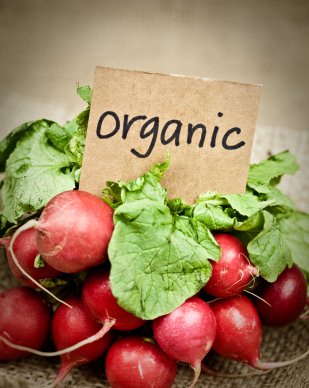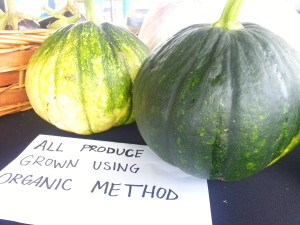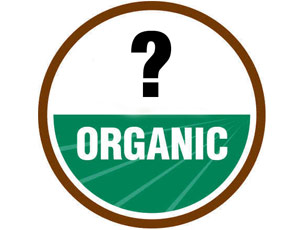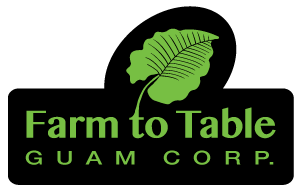
By Thalia Gange, Farm to Table Guam Business Manager
 Farm to Table Guam often gets inquiries from our readers about what the word ‘organic’ means, both from a legal standpoint and from the point of view of consumers who just want to know what they are eating.
Farm to Table Guam often gets inquiries from our readers about what the word ‘organic’ means, both from a legal standpoint and from the point of view of consumers who just want to know what they are eating.
USDA Organic Certified defines organic as “a production system that is managed in accordance with the Act and regulations in this part to respond to site-specific conditions by integrating cultural, biological, and mechanical practices that foster cycling of resources, promote ecological balance, and conserve biodiversity.” The ‘Act’ means the USDA National Organic Standards, which include following and documenting your methodology.
‘Naturally grown’ is defined as being essentially the same as organically grown, holding to the same methodologies and requirements, but without the same certification from the certifying organic agencies. Certified Naturally Grown offers certification in lieu of Certified Organic for smaller farms, where farmers with certification are available to do on site inspections.
Farm to Table Guam has been working with the farming community to make achievement of certification possible.
What about Guam?
 On Guam, there are no resident Certified Organic or Certified Naturally Grown inspectors from any recognized agency. Therefore, even for reputable farmers following all prescribed methodologies of organic farming, certification has been all but impossible up to now.
On Guam, there are no resident Certified Organic or Certified Naturally Grown inspectors from any recognized agency. Therefore, even for reputable farmers following all prescribed methodologies of organic farming, certification has been all but impossible up to now.
However, in recent times, local organizations, such as Farm to Table-Guam, Corp., have been trying to work with the farming community to make achievement of certification possible.
It is time-consuming and tedious, requiring a three-year commitment to record keeping just to achieve inspection for initial certification of organic. To maintain certification, periodic re-inspection, and continued record keeping is required.
We would like to make sure that people in the community know that there are farmers pursuing this goal, and that they are working their farms with organic methodologies. We do our best to showcase farmers pursuing such worthy goals by publicizing their operations, including them in the Farm to Table Farmer’s Market, and posting as much information as possible about them.
The Legal Stuff
We have attached links to two of the most respected sites containing the regulations and standards for Organic Certification: USDA National Organic Certification Standards, and Oregon Tilth Certified Organic. There are many, many other certifying organizations around the nation and world, all of whom have various, but similar approaches to organic production of food. Our purpose in discussing this issue, and attaching two sample organization reference material packages/regulations, is to show how seriously we take the observance of, documentation of, and compliance with, organic principles and regulations, when it comes to production of food at Farm to Table-Guam farms.
 Some have wondered what the difference is between “Organic Certified” and “grown by organic method” or “naturally grown” or “pesticide/herbicide free”, and other such labels. As a consumer, you want to ultimately know what you are eating, and the truth about its production. The USDA National Organic Standards and Oregon Tilth Certified Organic Procedures clear up the terminology.
Some have wondered what the difference is between “Organic Certified” and “grown by organic method” or “naturally grown” or “pesticide/herbicide free”, and other such labels. As a consumer, you want to ultimately know what you are eating, and the truth about its production. The USDA National Organic Standards and Oregon Tilth Certified Organic Procedures clear up the terminology.
Terms such as:
- Grown by Organic Method
- Organic
- 100% Organic
…may only be used by farms that have actually been through the required documentation/recordkeeping process, the inspection process, and have passed the certification process, OR are in the process of the 3 year required documentation period, are following the prescribed organic methodology, have annual farm sales less than $5,000, and are in compliance with labeling requirements.
Certified Organic
 This term may only be used once a farm has reached the point of achieving certification by an organization such as USDA Certified Organic, Oregon Tilth Certified Organic, or other such program. A three-year careful documentation of all growing methods, products used on farm, land plotting, seeds and seedling acquisition, etc., in compliance with organic methodology, followed by a passed inspection by the certifying authority will result in certification.
This term may only be used once a farm has reached the point of achieving certification by an organization such as USDA Certified Organic, Oregon Tilth Certified Organic, or other such program. A three-year careful documentation of all growing methods, products used on farm, land plotting, seeds and seedling acquisition, etc., in compliance with organic methodology, followed by a passed inspection by the certifying authority will result in certification.
Why should you care?
What does this mean to you, the consumer? Regardless of legal issues, you want to know your food origins, and have the right to know whether or not your food producers, claiming to offer “organic” food, are really giving you what you want. Reviewing the certification requirements may help you to know what questions to ask your food producers about their growing methods, i.e., if they are not yet certified, are a smaller farm, or still pursuing certification but following organic methodology. After all, what you really want to know is whether or not your food is healthy and non-toxic, and by whose standard, right?
Generally, farmers choosing to grow by the organic method are very dedicated to this production method, as well as being very proud of their farms. Often, they are more than willing to discuss any questions you may have about their farm or production methods, once you direct your inquiries to them. Organic growing takes conscientious effort on the part of the farmer.
See more information on produce labeling and the differences in pursuing official certification of labeling vs. informal labeling here.
Photo Sources: quicklabel.com, modernlyprimal.com, info.ibs-us.com
